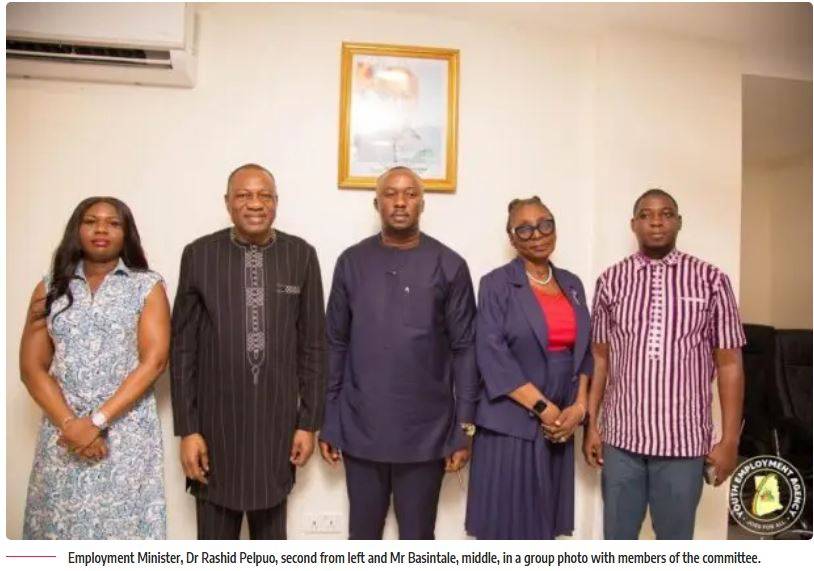The government of Ghana has taken a major step in tackling youth
unemployment through the official inauguration of Technical and Steering
Committees for the new Work Abroad Programme. The initiative, led by the
Ministry of Labour, Employment and Job Creation in partnership with the Youth
Employment Agency, is aimed at creating legal and safe migration opportunities
for Ghanaian youth seeking job experience overseas.
The launch was held after several weeks of intense planning and
collaboration among major national and international stakeholders. At the
ceremony, the Chief Executive Officer of the Youth Employment Agency, Malik
Basintale, reaffirmed the agency’s full commitment to the vision of President
John Mahama, which is to promote safe, structured, and meaningful labour
migration for the youth of Ghana. He said the programme is designed not only to
provide job opportunities abroad but also to equip Ghanaian youth with valuable
skills that will benefit the country's development when they return.
Malik Basintale stated clearly that the goal is to provide a new pathway for
Ghanaians to migrate legally and avoid the dangers of irregular migration. He
emphasized that all aspects of the programme would follow international labour
standards and that returning youth would be better positioned to contribute
positively to the country’s economy.
The Work Abroad Programme is expected to transform the job market for young
Ghanaians, especially in a time when many are eager to explore opportunities
outside the country due to limited options at home. By providing a legal and
well-managed route for international job placements, the government hopes to
reduce youth unemployment and improve livelihoods.
The newly formed committees will play an important role in making sure the
programme operates smoothly. Members include officials from several government
ministries and agencies such as the Ministry of Labour, the Ministry of Foreign
Affairs, the Labour Department, the Ministry of Youth and Sports, and the
Ministry of the Interior. Also included are the Ghana Immigration Service,
international bodies like the International Centre for Migration Policy
Development, the International Labour Organisation, and the International
Organization for Migration. Academic input is also provided by the Centre for
Migration Studies at the University of Ghana.
These diverse committee members are expected to bring in-depth experience
and expertise to guide the planning and management of the programme. Their
responsibilities will include oversight, regulation, and proper coordination
with both local and foreign partners. By involving international organizations
and universities, the government aims to maintain high standards in the
recruitment process and ensure the safety and dignity of every Ghanaian youth
who signs up.
The involvement of the International Labour Organisation and the
International Organization for Migration is also seen as a positive move that
will help the programme meet global best practices. Their role is to assist
Ghana in following ethical recruitment principles and in ensuring that job
seekers are protected from exploitation and abuse abroad.
Many observers believe that this initiative comes at a critical time when
thousands of young Ghanaians are looking for better opportunities and a
brighter future. It is expected that the programme will open doors for them in
sectors like healthcare, agriculture, construction, hospitality, and other
fields where their services are needed globally.
The committees are also expected to engage with recruitment agencies and potential
employers overseas to build trustworthy partnerships. This step is necessary to
avoid illegal middlemen and fraudulent recruitment schemes that have affected
many young Africans in the past. By centralizing the process under government
and credible partners, the Work Abroad Programme promises transparency and
fairness.
There is also a plan to provide orientation and training to selected
applicants before they travel. This will help them understand their rights,
responsibilities, and cultural differences they may face. It will also prepare
them to adapt quickly and represent Ghana positively in their host countries.
The launch of this initiative signals Ghana’s readiness to enter a new era
of responsible and beneficial labour migration. Stakeholders believe that if
the programme is properly managed, it could serve as a model for other African
countries seeking to reduce unemployment while preventing irregular migration.
As this programme kicks off, many young people are expected to show
interest, and the government says it will roll out detailed registration and
selection processes soon. The committees are now tasked with ensuring that
everything runs smoothly and that participants have a safe and productive
experience. The long-term goal remains the same: to give Ghanaian youth a
chance to grow through international exposure and return home empowered to
drive national development.




No comments yet
Be the first to share your thoughts!